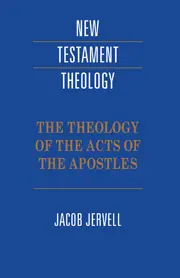

The Theology of the Acts of the Apostles
in New Testament Theology (Cambridge)
Pages
160
Publisher
Cambridge University Press
Published
6/28/1996
ISBN-13
9780521424479
Who are the people of God? Luke's purposes in Acts are to identify the Church, to establish the legitimacy of its gospel and to demonstrate that God was an active force in history. He shows that the communities of Jewish and Gentile Christians are the true heirs of God's promises to Israel. This is a theological interpretation of the history of the Church within history: Luke is an artist, a narrator rather than a systematic theologian, but he writes about the roles of God, Christ and the Holy Spirit and of the Church.
Reviews
Jacob Jervell has persistently attacked the previously dominant view that Acts is the product of a Gentile church seeking to justify its divorce from its Jewish beginnings. This volume provides a relatively compact summary of his views. It is a useful book because it provides a clear statement of an important point of view which, in the context of a class or elsewhere, can then be compared and contrasted with other interpretations. Chapter 3, "The Theology of Acts," covers almost a hundred pages and is the heart of the book. This chapter is preceded by two short chapters on "The Author and His Sources" and "Purpose and Historical Setting." It is followed by three short chapters comparing the views of Acts with other NT writings, discussing what Acts reveals about Jews and Gentiles in the early church, and commenting on "the significance of Acts for today." According to Jervell, Acts was addressed to a church of Jewish origin, or, at least, to a church in which Jews were a "mighty minority," that is, they continued to be a strong influence. In light of Jewish controversies over who is the true Israel, Luke's purpose is "to demonstrate and guarantee to his readers that the church actually is Israel" (p. 12) and so heirs of the promises. Jervell also believes that there was a threat of relapse into Judaism and that Paul was a special problem because he was regarded by many as an apostate Jew. The God of Acts is the God of Israel, Jervell insists, and the main concern, as in Jewish Scripture, is the relation of God to God's people, Israel.
[Full Review]
